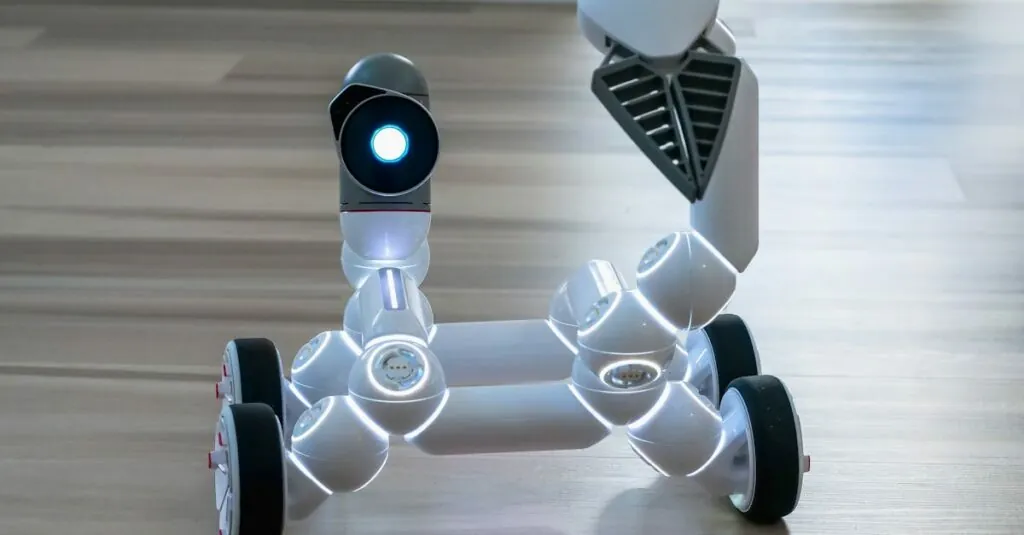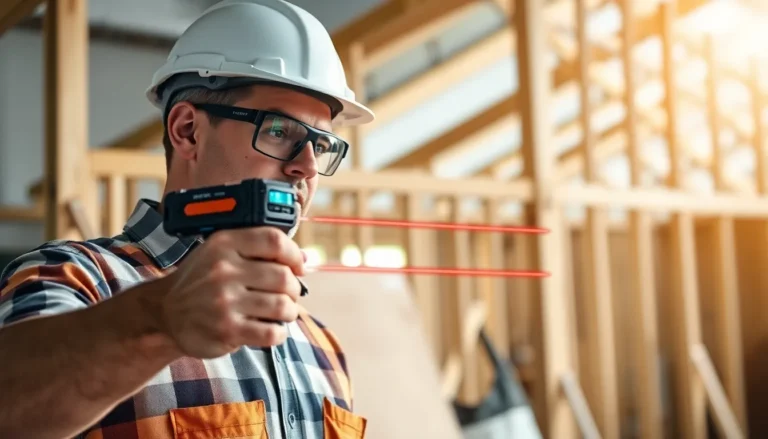Table of Contents
ToggleImagine waking up to the aroma of freshly brewed coffee, all thanks to a smart coffee maker that knows your morning routine better than you do. Smart home technology isn’t just a trend; it’s revolutionizing how people live, making homes more efficient, secure, and downright enjoyable. From voice-activated assistants that can dim the lights to security systems that alert you when the cat tries to escape, these gadgets are transforming ordinary living spaces into futuristic havens.
As homes become smarter, they also become more personalized. Gone are the days of fumbling for light switches or worrying if you locked the door. With a flick of a finger or a simple voice command, everything is at your fingertips. Dive into the world of smart home tech and discover how it’s not just shaping the future of living but also giving homeowners a sense of control and comfort like never before.
Overview of Smart Home Technology
Smart home technology encompasses various devices designed to improve daily living by enhancing comfort, efficiency, and security. This technology includes smart hubs, sensors, and appliances connected through Wi-Fi or Bluetooth. Smart hubs, for instance, act as central control points, enabling users to manage multiple devices from a single interface.
Voice-activated assistants play a crucial role in this innovation. They allow homeowners to execute commands and control devices using simple voice prompts. Devices like smart coffee makers or smart thermostats can adjust settings based on user preferences, creating a personalized living experience.
Integration of smart devices results in improved energy management and cost savings. Smart thermostats can learn user schedules and optimize energy use accordingly. Studies show that homes with smart energy systems can reduce energy consumption by up to 20%.
Security also benefits from smart home technology. Homeowners can utilize smart cameras and alarm systems that provide real-time monitoring and alerts through mobile devices. Research indicates that homes equipped with smart security systems experience lower burglary rates.
Comfort elevates with smart lighting solutions that adjust based on natural light levels or user activity. Many systems allow for automation, enabling lights to turn on or off at scheduled times. This functionality not only enhances convenience but also supports energy efficiency.
The future of living increasingly relies on smart home technology. As devices become more integrated and intuitive, homeowners enjoy greater control over their environments. Data from industry reports suggest that the smart home market is projected to reach $174 billion by 2025, underscoring its growing importance in daily life.
Key Innovations in Smart Home Tech
Smart home technology constantly evolves, significantly enhancing daily living. Innovations such as home automation systems, smart appliances, and advanced security solutions stand out as key components.
Home Automation Systems
Home automation systems simplify the management of various devices. Central hubs connect smart gadgets, creating a unified control experience. Users configure settings and routines through intuitive interfaces. Automation allows seamless integration across devices like lighting, heating, and entertainment systems. Voice control enhances accessibility, enabling hands-free operation. Real-time monitoring gives homeowners insights into their living environment, promoting efficiency.
Smart Appliances
Smart appliances transform mundane tasks into effortless actions. Devices like refrigerators, ovens, and washing machines connect to the internet for added convenience. Smart refrigerators monitor inventory, sending alerts for low supplies. Ovens can be preheated remotely, saving time during meal preparation. Washing machines offer notifications when cycles complete, allowing users to multitask effectively. Each appliance contributes to energy efficiency, lowering utility bills while enhancing daily routines.
Security Solutions
Security solutions provide peace of mind in today’s connected homes. Smart cameras offer high-definition video feeds, enabling remote monitoring from smartphones. Alarm systems send real-time alerts, ensuring prompt responses to potential threats. Motion sensors detect unusual activity and adjust settings accordingly. Integration with other smart devices bolsters security, allowing for automated locking of doors and windows. These advancements lead to decreased burglary rates and increased homeowner confidence.
Benefits of Smart Home Technology
Smart home technology offers numerous advantages that significantly enhance the quality of daily life. Homeowners experience increased convenience, energy efficiency, and heightened security through these innovations.
Enhanced Convenience
Devices like smart speakers and automated lighting streamline everyday activities. Voice-activated assistants allow users to control home systems hands-free. Smart coffee makers prepare beverages on demand, ensuring freshly brewed coffee is ready at the start of the day. Automating routines simplifies household management, reducing the time spent on mundane tasks. Integration of various devices through smart hubs further centralizes control, providing easy access to home features from a single interface.
Energy Efficiency
Smart thermostats adjust heating and cooling based on occupancy and preferences, leading to significant energy savings. Real-time data enables homeowners to track energy usage patterns, promoting informed decisions about consumption. Integrating smart devices such as energy-efficient lighting also plays a crucial role in reducing electricity bills. The ability to program and control devices remotely ensures optimal energy management, contributing to a greener environment. Overall, these technologies not only lower costs but also support sustainable living practices.
Improved Security
Advanced security features provided by smart home technology enhance homeowner safety. Real-time monitoring through smart cameras and motion sensors enables instant alerts for unusual activities. Automated locking systems allow users to secure doors remotely, ensuring peace of mind. Security cameras can be accessed from mobile devices, providing constant visual reassurance. These innovations significantly contribute to lowering burglary rates, making homes safer and more secure for residents.
Challenges Facing Smart Home Adoption
Smart home adoption faces several challenges that can hinder widespread usage. Understanding these issues is essential for improving integration and user experience.
Privacy Concerns
Privacy concerns rank high among challenges in smart home technology. Users frequently express worry over data collection practices and unauthorized access to personal information. Numerous smart devices continuously collect user data, leading to potential misuse. Reports indicate that many consumers fear hackers may exploit vulnerabilities in their home networks. Companies must prioritize robust encryption and transparent privacy policies to build trust. Such measures can help alleviate fears and encourage broader adoption among users.
Compatibility Issues
Compatibility issues present another significant challenge within smart home ecosystems. Various manufacturers produce devices lacking universal standards, resulting in difficulties in device integration. Homeowners often encounter problems when trying to connect devices from different brands. Incompatibility prevents users from taking full advantage of automation and centralized control systems. Industry leaders can address this by establishing open standards that support interoperability among devices. Collaborative efforts can ease compatibility concerns and promote a more seamless user experience.
The Future of Smart Homes
Smart home technology continues to evolve, shaping daily lives in unprecedented ways. Innovations lead to exciting opportunities for enhanced living experiences.
Trends to Watch
Growing interest in energy efficiency remains a significant trend. Smart thermostats and energy-efficient lighting systems reduce consumption while lowering bills. Increased adoption of voice-activated assistants improves accessibility, making smart homes more user-friendly. Enhanced interoperability among devices reflects a shift toward seamless integration, allowing for smoother user experiences. Finally, the demand for advanced security features, such as AI-enabled cameras and automated alerts, continues to rise, prioritizing homeowner safety.
Predictions for the Next Decade
Market analysts anticipate substantial growth in smart home technology. By 2033, the valuation may exceed $250 billion, reflecting skyrocketing consumer demand. Integration of artificial intelligence into smart devices promises improved personalization and automation. Developments in energy management systems aim to optimize power consumption based on real-time data. Furthermore, manufacturers are likely to prioritize cybersecurity measures to address privacy concerns, enhancing user trust and acceptance.
Smart home technology is undeniably shaping the future of living by enhancing convenience and security while promoting energy efficiency. As innovations continue to emerge homeowners can expect an ever-increasing level of control over their environments. The integration of smart devices not only simplifies daily tasks but also fosters a greater sense of comfort and safety.
With the market poised for significant growth the ongoing advancements in artificial intelligence and energy management promise to further transform how people interact with their homes. Addressing privacy concerns and ensuring compatibility among devices will be crucial for widespread adoption. The future looks bright as smart home technology becomes an integral part of modern living.







